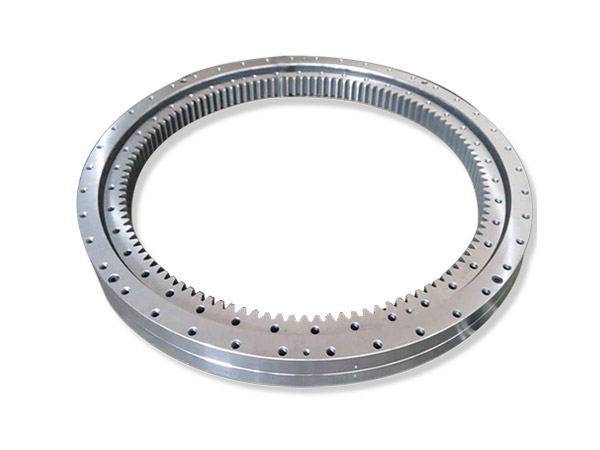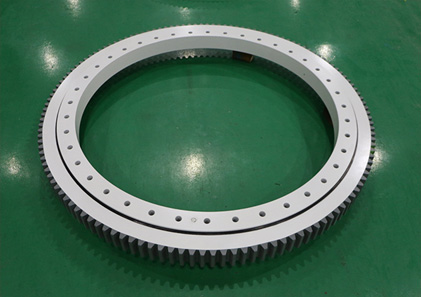What happens if the slewing bearing is improperly lubricated?
When buying slewing bearings, slewing bearing manufacturers will tell us to lubricate the bearings regularly, but for those who don’t understand, improper lubrication may occur during lubrication. Then, are the consequences of improper lubrication of slewing bearings serious? ? What happens if the slewing bearing is improperly lubricated? What should be paid attention to when lubricating bearings?
Consequences of improper lubrication of slewing bearings

1. Discoloration
Metal-to-metal contact will make the bearing temperature too high, causing the raceways and rollers to become discolored. In mild cases, this discoloration is due to the lubricant contaminating the bearing surface, while in severe cases, the metal discolors due to high temperatures. In all cases, early detection can avoid costly repairs.
2. Bearing heating
When the machine is running, the part where the bearing is installed is allowed to have a certain temperature. When touching the housing of the mechanism with your hand, it should be normal that you don’t feel hot, otherwise it indicates that the bearing temperature is too high. One of the reasons for excessively high bearings is poor lubrication of the bearings. The lubricating oil (or grease) used in rolling bearings has a certain working temperature. When the temperature is too high, water or ash enters the bearing seat, it will be seriously oxidized, emulsified, etc., which will lose its lubrication effect and cause the bearing to suffer from high temperature. And burned. In addition, poor quality of lubricating oil (or grease) itself or failure to add oil (grease) during operation will cause the bearing temperature to rise.
3. Scratches and peeling
Inspect the bearing for signs of cutting into the metal or peeling of the metal. These situations require immediate attention. Scratches and peeling are prone to occur in high-load low-speed applications or continuous high temperatures, and thin or insufficient lubricating oil film will accelerate the occurrence of the problem. Insufficient lubrication, wrong grease selection, or sudden changes in working conditions may cause bearing material to peel off or bearing ribs to scratch.
4. Abnormal bearing noise
If the bearing is in a good state of continuous rotation, it will emit a low whining or buzzing sound. If there is a sharp hiss, squeak and other irregular sounds, it often indicates that the bearing is in a poor continuous rotation condition. The sharp squeaking noise may be caused by improper lubrication.
5. The bearing is completely locked
Extreme local heating will produce metal flow in the bearing, changing the original material and geometry of the bearing. This may result in excessive tilting of the rollers, damage to the cage, and complete lock-up of the bearing. If catastrophic damage does occur, it is recommended to consult a bearing expert to determine the root cause of the problem, because it may be a factor other than lubrication.
Precautions for correct lubrication

1. Choose the right grease
Choosing a suitable grease will make the grease fully play the role of lubrication in the bearing operation, so that the bearing can be used for a longer time. The following are the points that need to be paid attention to when choosing the grease. Let’s take a look.
(1) Look at the working temperature: The working temperature of the lubricating part is an important basis for choosing lubricating grease. The typical components that use grease are rolling bearings. Under high temperature conditions, the temperature of the outer ring of the bearing is 15°C lower than the temperature of the inner ring. The temperature of the bearing operating at medium and low speeds (3000-5000r/min) is similar to the temperature of the internal medium. Under low temperature conditions, synthetic oil grease must be used, especially for some instrument miniature bearings, which have a small aerodynamic torque. Pay special attention to the selection of grease.
(2) Look at the running speed of the bearing: the speed of the lubricating component has a great influence on the bearing life of the grease. Therefore, when selecting lubricating grease, the movement speed of the lubricated part must be considered.
(3) Look at the environment: the environment of the lubricating part and the medium in contact have a great influence on the performance of the grease.
(4) Look at the filling method: the filling method of grease includes manual filling and centralized pump filling. Smearing or filling, grease gun filling, grease cup filling, etc. are manual filling and automatic filling.
2. Choose the right way
(1) Manual lubrication: This is a relatively primitive method. In the case of insufficient lubricating oil in the bearing, use an oiler to supply oil. It is usually used for light-load, low-speed or intermittent motion occasions. It is recommended to use the oil filler hole during operation. Dust cover or ball valve is set on it, and felt, cotton, wool, etc. are used as filter devices.
(2) Automatic lubrication: The automatic lubricator is a device used to replace manual refueling. The main advantage of this device is to save labor. It can refuel regularly and quantitatively, so that the life of the equipment can be prolonged, especially suitable for more complicated working conditions. Bottom, can reduce the safety risk of manual refueling. Using an automatic lubricator, you can continuously lubricate the running equipment automatically.
3. Add grease in time
Choosing the appropriate grease and lubrication method is the prerequisite for lubrication, but it is also necessary to add grease in time in daily use. This is also a problem that people often ignore or forget. Adding grease in time is to ensure that the bearing is running to meet the operating conditions Lubricating oil, which is also the key to extending the service life of the bearing.
The above is the whole content of the consequences caused by improper lubrication of the slewing bearing and the lubrication method. We understand that improper lubrication of the slewing bearing may cause the bearing to change color, heat, scratch and peel, have abnormal noise, lock up, etc. When lubricating, pay attention to the correct selection of grease and timely add grease, etc., which can effectively avoid the occurrence of improper lubrication.


